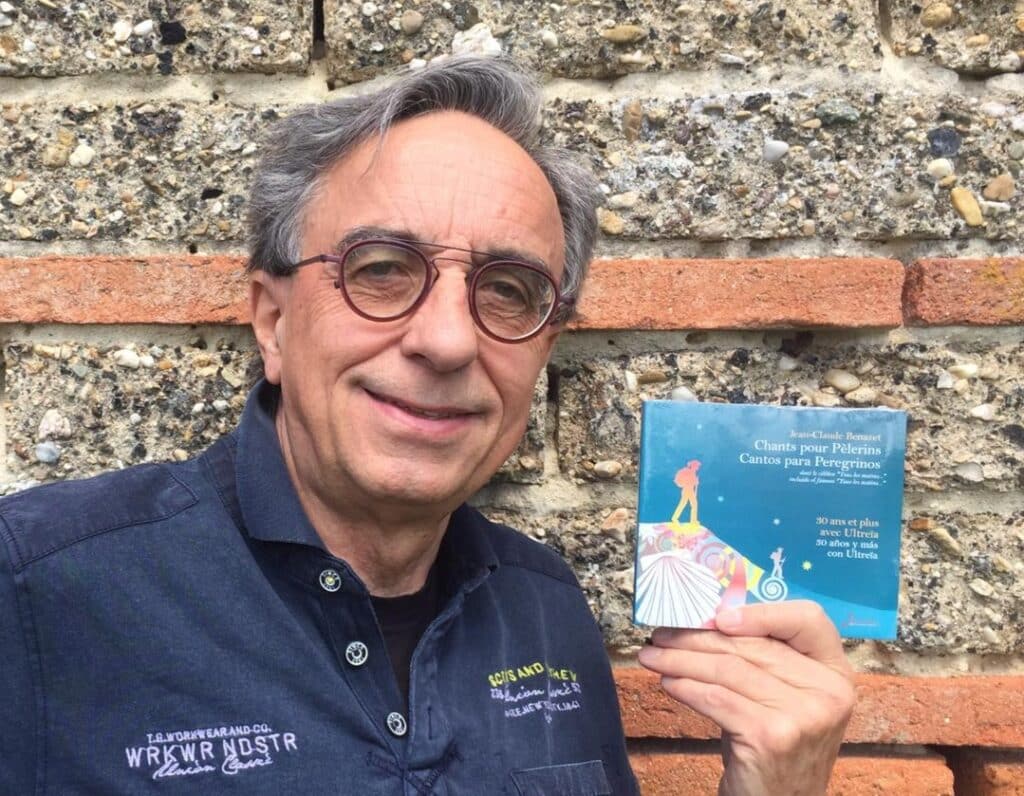Interview Jean-Claude Benazet – April 25, 2023
Of course, like many people, I knew this pilgrim’s song, having sung it at pilgrim’s meals, walking along the road in the company of other pilgrims. But where it came from, who wrote and composed it, when it was written, I had no idea.
Every morning …. Ultreïa
Every morning we take the road,
Every morning we go further.
Day after day, the road calls us,
It’s the voice of Compostelle.
Refrain: Ultreïa! Ultreïa ! Et sus eïa Deus adjuva nos!
Chemin de terre et chemin de Foi,
Europe’s millennial path,
Charlemagne’s Milky Way,
This is the path of all backpackers.
And all the way over there at the end of the continent,
Messire Jacques is waiting for us,
His smile has always been fixed,
The sun dying at Finisterre.
When I learned that Jean-Claude Benazet, the man behind this pilgrim song, first joined French society in the 1980s, and that he lived in Lavaur in the Tarn region of France, I wanted to meet him and hear his story.
We met at my home on a rainy Tuesday at the end of April, in Lautrec, just before 10 am. And as we sipped our tea, Jean-Claude told me.
This song was born on the road, in July 1989, while walking between Cajarc and Cahors, 34 years ago. It was created in 4 days by me, a non-musical pilgrim, to fill in the hours on the way. It was created without any musical or poetic objective.
When he wrote this song, Jean Claude was not on his 1st pilgrimage route. “My 1st route was in 1981, before the yellow arrows”, he tells me. Before setting off, he contacted Jeanine Warcollier, general secretary of the SFASJC, and became a member of the SFASJC. He set off with the only French-language guidebook in existence, “Le Chemin de Saint-Jacques en Espagne”, written by Abbé Georges Bernès in the 1970s, and for many years the only French-language guidebook.
Jean-Claude takes up his story.
It’s a short song, easy to remember. In the first stanza, I wanted to evoke the daily life of the pilgrim.
In the 2nd stanza, I wanted to talk about the history of the pilgrimage to Santiago and Charlemagne’s dream.
In the 3rd stanza, I address what awaits the pilgrim on arrival at Santiago de Compostela. On “EL PORTICO DE LA GLORIA” (The Gate of Glory), St James gazes with a slight smile at the dying sun at Cape Finisterre, as if to encourage the pilgrim to go there.
As for the refrain, I could only borrow the words of Dum Pater familias, that beautiful medieval song. It’s worth recalling: Ultreïa et sus eïa, Deus adjuva nos. Which means: “Help us, God, to go ever further and ever higher. ….
The 1st divulger of this song is José Ignacio Díaz, currently parish priest of Santiago el Real in Logroño. “At the beginning of August 1989, I shared the song with him. Since then, he has sung it at every pilgrim blessing.”
For 30 years, the song has spread by word of mouth. Some suppressed the last stanza, calling it heretical. Others changed the lyrics, added stanzas, accused Jean-Claude of plagiarism for the music… But the pilgrim’s song went its own way. Jean-Claude doesn’t like his song to be distorted, truncated, lengthened or denigrated.
In 2012, he decided to take matters into his own hands. Helped by his son, he posts the song on youtube.
In 2015, Jean-Claude meets a Spanish guitarist: José Ignacio H. Toquero, who will help him record his first album.
In 2019, the CD is released. 1300 copies are in circulation. The CD, entitled “Chants pour pèlerins” (Songs for pilgrims), includes other songs whose music and lyrics were also written by Jean-Claude, such as “A Fisterra llegaré” and “Porqué tan lejos”, as well as other selected pieces.
And if you would like to have the musical score, please contact Jean-Claude directly, who is the sole owner and holder.
Jean-Claude has other strings to his bow. He is currently producing a lecture on the legend of the “Hangman/Dependant”. Remember the rooster and the hen in the beautiful Gothic henhouse of Santo Domingo de la Calzada cathedral?
But that’s a story for another time.


